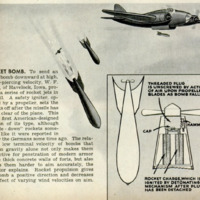Aerial bombs with rocket propulsion
Item
-
Title (Dublin Core)
-
Aerial bombs with rocket propulsion
-
Article Title and/or Image Caption (Dublin Core)
-
Rocket bomb
-
extracted text (Extract Text)
-
ROCKET BOMB. To send an
aerial bomb downward at high,
armor-piercing velocity, W.. F.
Rouse, of Havelock, Iowa, pro-
poses a series of rocket jets in
the tail. A safety igniter, op-
erated by a propeller, sets the
rockets off after the missile has
fallen clear of the plane. This
is the first American-designed
weapon of its type, although
“upside - down” rockets some-
thing like it were reported in
use by the Germans some time ago. The rela-
tively low terminal velocity of bombs that
rely on gravity alone not only makes them
ineffective for penetration of modern armor
or the thick concrete walls of forts, but also
makes them harder to aim accurately, the
inventor explains. Rocket propulsion gives
the bomb a positive direction and decreases
the effect of varying wind velocities on aim.
-
Language (Dublin Core)
-
eng
-
Date Issued (Dublin Core)
-
1944-05
-
pages (Bibliographic Ontology)
-
90
-
Rights (Dublin Core)
-
Public Domain (Google digitized)
-
References (Dublin Core)
-
Iowa
-
Archived by (Dublin Core)
-
Lorenzo Chinellato
-
Alberto Bordignon (Supervisor)
 Popular Science Monthly, v. 144, n. 5, 1944
Popular Science Monthly, v. 144, n. 5, 1944
 1.png
1.png
